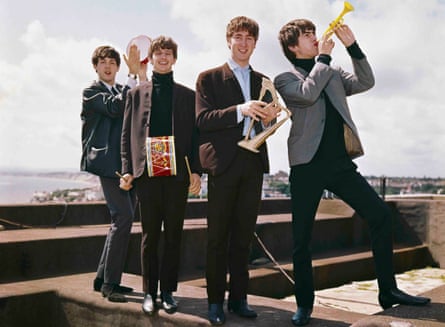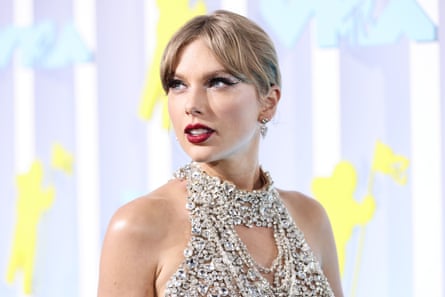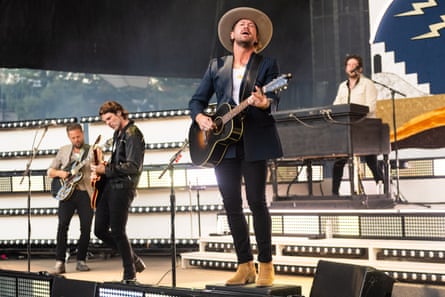When David Crosby helped found the Byrds, the idea of being in a band like the Beatles was intoxicating. The musician, who died last week, and his bandmates were so obsessed with the Beatles that they watched A Hard Day’s Night and went straight out to buy the same instruments.
A modern-day Crosby would be well advised not to bother – bands are almost entirely absent from the music charts. Only four new songs by groups made it into the official Top 100 singles of last year, which was dominated by solo acts and a smattering of classics by the likes of Fleetwood Mac and Arctic Monkeys.
There’s no shortage of new music. Lucian Grainge, chairman of Universal Music, complained earlier this month that some streaming services are uploading 100,000 tracks a day.
So why have bands struggled to find success compared with solo megastars like Ed Sheeran and Taylor Swift? The obvious culprit is social media, according to Chris Price, head of music for Radio 1 and 1Xtra, and the executive in charge of the stations’ playlists.

“Social media is more of a solo pursuit,” he said. “It’s easier as a solo artist to convey who you are and the kind of artist you are on TikTok or Instagram than for four guys to do the same thing.”
Record company A&R departments are much more likely to scout for talent online, checking follower counts and engagement metrics, rather than trying to size up a four-piece performing in a sweaty pub. Breaking a band now means going viral or getting a “sync” deal with a TV show or advert.
This is not just about rock’n’roll. “When I first got into rap music in the 80s and 90s, it was Public Enemy, N.W.A, Wu-Tang Clan,” Price said. “In the last 10 years, it’s Drake and, in the UK, it’s Stormzy and Dave.”
The same goes for dance music. “The Chemical Brothers were a band. Orbital were a band,” Price said. “I guess I’ve got a more sentimental attachment to bands than people born in the last 20 years.
“At Radio 1, we have this balancing act every week, making sure we have an ethnically diverse playlist, and a balanced playlist in terms of male and female artists. Do we actively seek out bands over solo artists? Not necessarily, but I won’t pretend I’m not delighted that Wet Leg are the breakout band of 2022, and I’m thrilled when the 1975 headline Radio 1’s Big Weekend.”
The rapid development of music technology is another factor, with software such as Ableton Live allowing people to release studio-quality music from their bedrooms for less than the cost of an electric guitar and amplifier.

“In the heyday of the band, in the 60s, if you wanted to make noise for people to dance to, you needed a band,” said David Hepworth, author of Overpaid, Oversexed and Over There, and former editor of Smash Hits. “Now you just need a laptop. When the Beatles arrived in 1964 [in the US], the thing that was amazing to people like Bruce Springsteen and Tom Petty was that they were a band. Americans didn’t really have bands.”
From Elvis Presley and Jerry Lee Lewis to Madonna, Michael Jackson and Lady Gaga, the American tradition has been towards solo artists, Hepworth said.
“Whereas with the British invasion, what appealed was that there was a gang that you wanted to join. And there was the implicit promise that you could have a similar gang with your friends at school or college.”
Although websites such as Join My Band have replaced the Melody Maker classifieds as a way to find that gang, new bands such as FLO and Yard Act also need places to play.
“It is expensive to buy instruments, rent rehearsal spaces and go on the road,” said Louis Bloom, president of Island Records UK. “We are seeing music venues close in city centres where prime real estate is being converted into flats and offices.” Tomorrow sees the start of Independent Venue Week to support 300 grassroots venues – the UK has lost about a third of its venues in the last 20 years.
Even so, “incredible and inspirational bands are still coming through”, Bloom said. “The demand is there because it’s still one of the greatest things any of us can experience, watching a band we love playing live, whether that’s in a tiny club or the mainstage at a festival.”
Electronic music makers may appear to be solo artists but are often part of a broader group, such as a hip-hop crew or a DJ collective.

LF System were one of the four groups to make the Top 100 last year with a new song, their dance anthem Afraid To Feel, alongside other dance acts Belters Only and Bad Boy Chiller Crew, and guitar band OneRepublic.
The duo, Conor Larkman and Sean Finnigan, met while clubbing in Edinburgh and Glasgow.
“We realised that we played and liked very similar music so started DJing together,” Larkman said. “Even if you think an artist is solo, they still, most likely, have a whole team behind them, helping them.”
Stormzy may be one of the most successful British solo artists of the last decade, but when he appeared on the front cover of January’s Sound on Sound magazine, he insisted that his crew were also in the picture and equally prominent.
“Maybe there are some signs that we’re seeing the return of bands and groups,” Price said. “It’s hard to argue that Wet Leg aren’t the biggest breakout artist of 2022. FLO won Radio 1’s Sound Off poll of 2023 and they won the Brits rising star [award] as well. That’s significant. I’d love to see more bands.”









